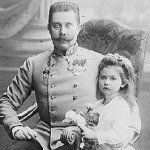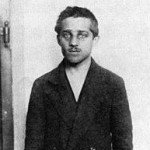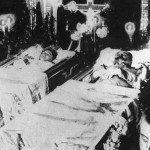
In another time and another set of circumstances, the assassination in Sarajevo of the Archduke Franz Ferdinand would have caused outrage, but not a world war. But coming as it did after two decades of tension within Europe generally and the Balkans specifically, the murder of the Austrian royal proved a flashpoint in history. It generated a wave of anti-Serbian sentiment within the Austro-Hungarian empire, providing Austrian military leaders – who had long fancied a war of suppression against the troublesome Serbs – with the perfect excuse for one. Backed by Germany and its strutting, cock-sure kaiser, Austria-Hungary’s aggression catapulted Europe into crisis, threats and war.
Franz Ferdinand was the nephew of the Austro-Hungarian emperor Franz Josef, and had been the heir to the imperial throne since 1889. Educated in history and the classics, the archduke was intelligent, well-informed and more worldly than most (in the 1890s he had completed a ‘grand tour’ across three continents, which included a lengthy stay in Australia). Ferdinand could also be strong-willed to the point of stubbornness. An example of this was his determination to marry a non-royal, Sophie Chotek, against all advice from his family and political leaders; the marriage was approved but was morganatic, meaning that Ferdinand’s children could not succeed him as emperor. Ferdinand’s politics were surprisingly liberal: he believed that rights, freedoms and concessions to the empire’s ethnic groups might need to be considered; he also expressed the view that the growth of revolutionary movements in the Balkans was, in part, the product of Austro-Hungarian heavy-handedness. These views put him at odds with his uncle, the emperor, and Vienna’s conservative political and military elite. It also made Ferdinand’s eventual fate more of a tragedy, since he was one of the few men broad-minded enough to save the ailing empire.
“The assassination at Sarajevo was certainly the crucial precedent of the European war that its conspirators had sought, but was not the historical cause. Nearly sixty years later Vaso Cubrilovic, who as a historian had taught forty years at the University of Belgrade, insisted that the seven young men were not responsible. ‘The outbreak of the war had nothing to do with individuals. The war had deep roots, including the disruptive effects of rapid industrialisation in old feudal societies … The assassination acted as a lever, prying the various powers into predictable paths.”
J. Bowyer Bell, historian
On June 28th 1914, Ferdinand and his wife were touring Sarajevo, then part of the Austro-Hungarian empire, now the capital of Bosnia. They were targeted by a small band of Serbian nationalists, who had been inflamed by Austria’s takeover of Bosnia-Herzegovina. No strangers to political violence, a faction of this group plotted to assassinate the archduke in the streets of the city. At 10.10am they launched their first attempt. Cabrinovic, a Serbian youth, threw a small bomb towards the open-topped car carrying Ferdinand and his wife – however the bomb bounced harmlessly off the rear of the car, then detonated beneath the vehicle following, destroying it and wounding more than a dozen people. Cabrinovic fled, swallowing a suicide pill then jumping into a nearby river; he could not even get that right, vomiting up the pill and landing in water that was barely ankle-deep. He was soon captured, while his collaborators watched as the royal car sped away. They slunk away into Sarajevo’s backstreets, thinking their opportunity had passed and the plan had failed.

They would have been right if not for some fortuitous luck. Franz Ferdinand interrupted his schedule to call at the hospital, to check on those wounded in the earlier attack. After leaving the hospital his car drove down the wrong street and ended up outside a sandwich shop. One of the assassins, Gavrilo Princip, emerged from the shop, having just bought his lunch. Princip drew two pistols and fired at the royal car: his first shot struck the archduke’s wife Sophie in the stomach, the second hit Ferdinand’s throat. Again the car sped away to seek medical help, arriving at the governor’s residence minutes later. Sophie died before she could be removed from the car; Franz Ferdinand was hauled inside but died on a chaise lounge minutes later. The murder of this comparatively popular royal incited a flood of anti-Serb protests and violence in many Austro-Hungarian cities, including Sarajevo itself. Serbian stores and buildings were vandalised and some suspected Serb nationalists were beaten up. Across Europe there was widespread shock at the murder, along with messages of support for Vienna and encouragements for her to take tough action against the terrorists.

The immediate response of the Austro-Hungarian regime was to demand an inquiry into the assassination and those involved, to be conducted on Serbian soil by Austrian authorities. But the Serbian government rejected this, declaring that Serbian officials had no involvement whatsoever in the killings and that “the matter did not concern the Serbian government”. This precipitated the ‘July crisis’, a month of ultimatums, threats and bickering, during which the leaders of Europe advanced the case for both war and peace. Franz Ferdinand and Sophie were buried in a family castle in Austria, after a private funeral which no foreign royals or dignitaries were invited to (not even the German kaiser or Emperor Franz Josef himself attended). Gavrilo Princip and all but one of his associates were captured, interrogated by Austro-Hungarian authorities and placed on trial. Some were executed, however since contemporary laws prohibited the execution of anyone under 20, most of the conspirators were given 20-year prison sentences. Princip was spared because of his age but he suffered terribly in jail, contracting tuberculosis and later having an arm amputated. He died in April 1918, six months before the end of the war he had helped instigate.

1. Archduke Franz Ferdinand was an Austrian royal, a nephew of Emperor Franz Josef and the heir to his throne.
2. The archduke was intelligent, worldly and liberal-minded, which set him at odds with his conservative family.
3. In June 1914 Ferdinand was touring Sarajevo, Bosnia, when he fell victim to a terrorist gang of Serbian nationalists.
4. The assassins were young, nervous and clumsy but one, Princip, stumbled across the duke’s car.
5. Both Ferdinand and his wife were shot in their open-topped car and died within an hour, while Princip and his collaborators were soon arrested. The murder caused outrage around the world.
© Alpha History 2014. Content on this page may not be republished or distributed without permission. For more information please refer to our Terms of Use.
This page was written by Jennifer Llewellyn, Jim Southey and Steve Thompson. To reference this page, use the following citation:
J. Llewellyn et al, “Assassination in Sarajevo” at Alpha History, https://alphahistory.com/worldwar1/assassination-in-sarajevo/, 2014, accessed [date of last access].
